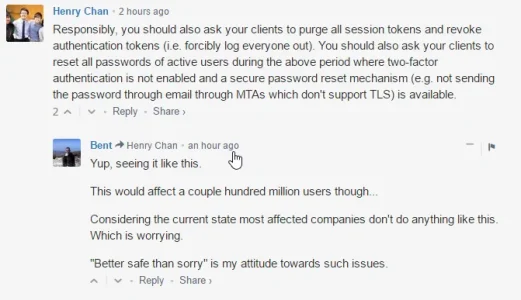jOOc
Active member
Between 2016-09-22 - 2017-02-18 passwords, private messages, API keys, and other sensitive data were leaked by Cloudflare to random requesters. Data was cached by search engines, and may have been collected by random adversaries over the past few months.
https://github.com/pirate/sites-using-cloudflare (xenforo.com is on the list)
https://blog.cloudflare.com/incident-report-on-memory-leak-caused-by-cloudflare-parser-bug/
https://www.theregister.co.uk/2017/02/24/cloudbleed_buffer_overflow_bug_spaffs_personal_data/
'This leak was triggered when webpages had a particular combination of unbalanced HTML tags, which confused Cloudflare's proxy servers and caused them to spit out data belonging to other people – even if that data was protected by HTTPS.'
#Cloudbleed
https://github.com/pirate/sites-using-cloudflare (xenforo.com is on the list)
https://blog.cloudflare.com/incident-report-on-memory-leak-caused-by-cloudflare-parser-bug/
https://www.theregister.co.uk/2017/02/24/cloudbleed_buffer_overflow_bug_spaffs_personal_data/
'This leak was triggered when webpages had a particular combination of unbalanced HTML tags, which confused Cloudflare's proxy servers and caused them to spit out data belonging to other people – even if that data was protected by HTTPS.'
#Cloudbleed
